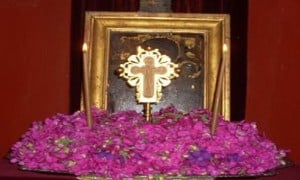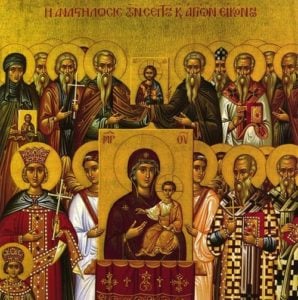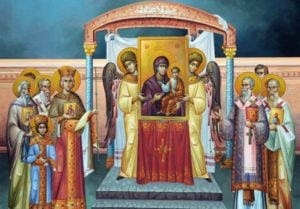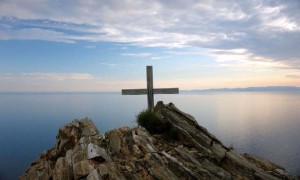The Great Fast
27 March 2012How often do we begin Great Lent with sighs of regret! “The fast is almost upon us again! Enjoy meat while you can!”. “A contradiction in terms though it is: happy Lent!”. Such are the comments many Orthodox Christians make about Lent, and it sadly proves that we do not have a clue what Lent is all about.
We have grown accustomed to thinking of Lent in purely negative terms: in terms of giving something up, somewhat begrudgingly at that, for reasons of personal ascesis or even out of a sense of religious obligation. Even the ascetical character of Lent is often overlooked, and we see fasting more as a change of diet than as a feat of ascesis. Lent is indeed a time for ascesis, for giving things up, and it is the sacred duty of those who are able to fast to do so, but this is only a part of the truth. The real lessons for Lent tend to go unheeded. The period leading up to Great Lent, from the beginning of the season of the Triodion until Clean Monday, is usually thought of as a time for excessive eating, for enjoying all the culinary delights that we will so sorely miss during the Great Fast. We are so obsessed with this concept of food that we tend to ignore the hymns of the Triodion and the appointed readings from the scriptures for the season, which tell us how we should fast and why.
Before the season of the Triodion begins, the Gospel lesson about Zacchaeus is read at the Sunday Liturgy. The Gospel narrative tells us of how Zacchaeus, an unjust man and a tax collector (a profession despised and sinful among the people ofIsrael), desperately wanted to see Christ, but could not amongst the great crowds of people for his short stature, and so he climbs a tree to get a good look at Him. When Christ sees him, He tells him that He wishes to have supper with him. So moved is Zacchaeus by the Lord’s acceptance of him, that on the very evening that Christ eats with him, he gives away half of his possessions to the poor and to anyone he has defrauded he gives back four times as much. Christ says, “Today salvation has come to this house” (see Luke 19: 1-10).
What is the connection between this Gospel lesson and Great Lent? To answer this, let us look at an extract from another reading, this time from the prophet Isaiah (58: 4-7):
“If you fast for quarrels and fights, and smite the humble with your fists, why do you fast for me as you do today, for your voice to be heard in your cry? I did not choose this fast, nor a day for a person to humble his soul. Even if you bend down your neck like a ring, and spread under you sackcloth and ashes, you shall not because of this call it an acceptable fast. I did not choose such a fast, says the Lord. But untie every bond of iniquity, unfasten the knots of hard bargains, send the bruised away with remission, and cancel every unjust account. Break your bread for the hungry, and lead the poor who have no shelter into your house: if you see someone naked, clothe him, and you are not to disregard the relations of your own seed”.
Zacchaeus did precisely what the Lord says through the prophet Isaiah: “Untie every bond of iniquity, unfasten the knots of hard bargains… cancel every unjust account. Break your bread for the hungry…”, and it is such a fast that the Lord wants from us. Great Lent does not call us to fast only from food, but to fast also from wrongdoing and injustice. A hymn of the Triodion echoes the lesson of the reading from Isaiah:
“While fasting physically, brethren, let us also fast spiritually. Let us loose every knot of iniquity. Let us tear up every unrighteous bond. Let us distribute bread to the hungry and welcome to our homes those who have no roof over their heads, so that we may receive great mercy from Christ our God”.
The season of the Triodion begins on the Sunday of the Tax Collector and the Pharisee. This Gospel Reading (Luke 18: 9-14) was chosen because, through the figure of the Pharisee, who boasts before God, “I fast twice a week; I give a tenth of all my income”, the Church is warning us to “flee the proud speech of the Pharisee” when we fast. We can see from the Gospel reading that even the Pharisee’s charity is unacceptable to God, because he prides himself on doing no more than what is required of him: “When you have done all that you were ordered to do, say, ‘We are worthless servants; we have done only what we ought to have done!” (Luke 17:10). Moreover, the Pharisee looks down on others for their failure to do what is required of them: “God, I thank you that I am not like other people: thieves, rogues, adulterers, or even like this tax collector”. We must not fast with such a judgemental and self-righteous attitude, as the Triodion warns us:
“Those who thirst for spiritual blessings perform their good deeds in secret, not noising them abroad in markets. But let us ceaselessly pray in the depths of our hearts. For He who sees all that is done in secret will reward us for our abstinence”.
The difference between the Tax Collector and the Pharisee does not lie in fasting or not fasting, but in the pride and arrogance of the Pharisee on the one hand, and the humility and self-reproach of the Tax Collector on the other. It is not only those who fast who should be warned by the lesson of this parable. Those who do not fast should not do so with a judgemental attitude, by identifying themselves with the justified tax collector and judging those who fast as Pharisees, thus adopting both the sin of the Tax Collector and Pharisee alike. Humility befits every Christian, whether he fasts or not. If we find ourselves judging others for their lack of humility, it is a good indication that we are in desperately short supply of humility ourselves.
On the following Sunday, we hear a reading fromSaint Paul’s first epistle to the Corinthians:
“Food is for the stomach and the stomach for food, and God will do away with both the one and the other. The body is meant not for fornication but for the Lord, and the Lord for the body…Do you not know that your bodies are members of Christ? Should I therefore take the members of Christ and make them members of a prostitute? Never!” (1 Cor. 6: 13-15).
Through this epistle reading, the Church warns us that we are not only to abstain from food, but also from other more spiritually harmful passions. To fast from food but not from more serious passions is very much a case of ‘straining at a nat and swallowing a camel’. The Triodion sternly warns us against such double standards:
“In vain do you rejoice in not eating, O soul!
For you abstain from food,
But from passions you are not purified.
If you have no desire for improvement,
You will be despised as a lie in the eyes of God,
You will be likened to evil demons who never eat!
If you persevere in sin, you will perform a useless fast;
Therefore, remain in constant striving
So as to stand before the Crucified Saviour, or rather,
To be crucified with the One who was crucified for your sake”
There is another important lesson for this day: the parable of the Prodigal Son. This famous parable, like Great Lent, is often viewed in purely negative terms. So often, we focus on the sin of the Prodigal, reminding us that we are all prodigals who have run away from the will of God and are in need of repentance. This is of course true, and it is a perfectly acceptable exegesis of the parable, but it is only half of the story. The parable could just as well be called, ‘the parable of the unforgiving brother’, for, ultimately, the great lesson of the parable is that we are not to imitate the elder son who was angry that his brother had been forgiven and warmly received back home by his father. The elder son, while he always adhered to his father’s rules, had no compassion, no willingness to forgive even his own blood brother. The parable could also be called ‘the parable of the compassionate father’, whose readiness to forgive we are called to imitate. We should identify ourselves not only with the prodigal who disobeyed the father and squandered everything his father had given him on a sinful life, but also with the elder brother who was angry and jealous that his brother, after enjoying a life of sin and pleasure, was now being honoured and welcomed back for his change of heart. As the classic prayer of Great Lent urges us: “Grant that I may see my own faults and not condemn my brother”. The beauty of this prayer of St Ephrem the Syrian is that it is at once both a prayer and a lesson. As we say this prayer day by day during Great Lent, it becomes clear to us that it is very much a case of ‘Lord, I believe; help my unbelief!”, or to put it more explicitly: ‘Lord, I believe that I should not condemn; help me to really believe it!”
This is also the lesson of the appointed Epistle Reading for the following Sunday (Meatfare Sunday), which is the Sunday of the Last Judgement. According to this reading (1 Cor. 8: 8-9:2), “Food will not bring us closer to God. We are no worse off it we do not eat, and no better off if we do”. This is an interesting lesson as we come closer to the Great Fast. We are told that fasting, in and of itself, will not save us, and therefore fasters are not to judge non fasters as sinners and non fasters are not to judge fasters as Pharisees. As we hear on Cheesefare Sunday:
“Those who eat must not despise those who abstain, and those who abstain must not pass judgement on those who eat; for God has welcomed them. Who are you to pass judgement on servants of another? It is before their own lord that they stand or fall”. (Rom.14: 3-4)
It is not by fasting or not fasting that we shall win or lose Christ, but by our neighbour. This lesson is stated even more explicitly in the appointed Gospel Reading for Meatfare Sunday (Matt. 25: 31-46), when we hear Christ tell us how we shall be judged: by whether we have fed the hungry, clothed the naked, helped the sick, welcomed strangers. What is the connection between all this and fasting? Many of the Church Fathers frequently speak of fasting in connection with charity, and the Triodion, as we have already seen, unambiguously demonstrates that there is an unmistakeable connection between fasting and good works:
“Let us hurry to be cleansed through fasting from the stain of our faults and through mercy and compassion for the poor to enter the bridal chamber of Christ the Bridegroom, who grants us his great mercy”.
How is it that while the connection between fasting and almsgiving is so obvious to the Church Fathers and so explicit in the hymns and appointed readings for this period, it completely slips our attention? Perhaps, as I said at the beginning, it is because, first of all, we think of fasting in ‘personal’ terms – we think of ascesis and Christian love of our neighbour as two different things; and secondly, because our ‘ascesis’ is little more than a change of diet. During the Fast, some of us tend to gorge on foods which are even more rich and exotic than what we eat outside of Lent. The rules of fasting are supposed to help us and encourage us both to eat less and to eat simpler and cheaper foods in order that we may be able to make provision for the poor. If our fasting does not help us financially to provide for the needy, if we are spending just as much on ourselves as we always do, then perhaps we are not fasting as we should. There are some people who are well off enough to always be able to help the poor, but many of us do not have the means to do so. The beauty of Great Lent is that fasting enables those of us who are not normally able to help the less fortunate by giving food or money or clothing to do so. But the lessons of Lent are not only lessons for each of us as individuals; they are also lessons for us as a church, as a community. If my own personal abstinence, my giving something up that I may be able to give more to others, my fasting as an individual, can enable me to give to those in need, then imagine what a whole community could do if it held such a fast; imagine a whole city, a whole nation, even the whole world performing such a fast! But every community is made up of individuals, and as Christians, we all have a duty to practice Christianity according to his or her own capacity. Lent is a time for giving things up, but giving them up in order to give to others. If our fasting is not accompanied by such love and sacrifice, then we will ‘perform a useless fast’, as the Triodion warns us. It is by love that we will be judged, and the Gospel Reading for Meatfare Sunday makes this abundantly clear. Fasting is a means – a potentially very effective means – of putting charity and compassion for the poor, sick and lonely into practice, together with all the other virtues: humility, repentance, restraint, self-control, prayer, forgiveness.
The last virtue I mentioned: forgiveness, is the theme of the final Sunday before the beginning of the Great Fast – Cheesefare Sunday. Our fasting has already begun. We should have spent the week abstaining from meat, though we continue to eat all other foods, as we prepare physically and psychologically for the period of sacrifice that lies before us; but as Christ tells us:
“When you are offering your gift at the altar, if you remember that your brother or sister has something against you, leave your gift there before the altar and go; first be reconciled with your brother or sister, and then come and offer your gift”. (Matt. 5: 23-24)
Our fast will not be acceptable to God if there is any enmity between us. We have already heard the lesson of forgiveness in the parable of the Prodigal Son, but on Cheesefare Sunday it is stated in more certain terms: “If you forgive others their offences, your heavenly Father will also forgive you; but if you do not forgive others, neither will your Father forgive your offences” (Matt. 6: 14-15). That is how the Gospel Reading for Cheesefare Sunday begins. If our fasting is to be acceptable to God, if we are to be forgiven for our sins, if we are to ‘be perfect as our Father in heaven is perfect’, then we must imitate Him by forgiving others. For this reason, on the evening of Cheesefare Sunday, at Vespers, we ask one another to forgive us for any wrongs we may have committed, for anything we may have done or said or failed to do or say, which may have grieved our neighbour, and we forgive all those who have injured us in any way from the depths of our hearts, that we too may be forgiven and that our fast may be acceptable to God Who always forgives.
But the lessons of the season of the Triodion are not just lessons for Great Lent; they are lessons for our whole life. The Christian life as a whole is a great fast: a time for good works, for repentance and confession, for charity and forgiveness, for humility and sacrifice and love, a time to abstain from judgement and wrongdoing. Just as we must pass through the period of Great Lent in order to reach the Great Feast of Pascha, so too must we go through the great fast that is the Christian life in order to partake in the life of the Resurrection: that great eternal feast that is theKingdomofGod. As the Triodion says:
“Desiring to commune with the Divine Pascha… let us pursue victory over the devil through fasting”.














